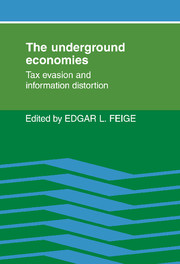Book contents
- Frontmatter
- Contents
- List of contributors
- Preface
- Introduction
- Part I The meaning, measurement, and policy implications of the underground economies
- 1 The meaning and measurement of the underground economy
- 2 Information distortions in social systems: the underground economy and other observer – subject – policymaker feedbacks
- 3 Policy illusion, macroeconomic instability, and the unrecorded economy
- 4 How large (or small) should the underground economy be?
- Part II The underground economy in Western developed nations: measurement in different laboratories
- Part III The underground economy under central planning
- Bibliography
2 - Information distortions in social systems: the underground economy and other observer – subject – policymaker feedbacks
Published online by Cambridge University Press: 20 October 2009
- Frontmatter
- Contents
- List of contributors
- Preface
- Introduction
- Part I The meaning, measurement, and policy implications of the underground economies
- 1 The meaning and measurement of the underground economy
- 2 Information distortions in social systems: the underground economy and other observer – subject – policymaker feedbacks
- 3 Policy illusion, macroeconomic instability, and the unrecorded economy
- 4 How large (or small) should the underground economy be?
- Part II The underground economy in Western developed nations: measurement in different laboratories
- Part III The underground economy under central planning
- Bibliography
Summary
Social indicators are historically important as part of the general effort to quantify information into data usable for the social sciences. This development has fundamentally changed the character of every such field of inquiry. The earlier qualitative and philosophical approach to the study of human behavior has given way to quantitative and formal attempts to mimic the natural sciences by emphasizing statistical inference and experimental design. Specialization grew dramatically not only between disciplines but also within them. Political economy became political science and economics. Economics split into macro- and micro-specialties.
Although major gains have resulted from the tendency to quantify and specialize, there have also been major costs, and every discipline debates the relative costs and benefits of these developments. In those social sciences concerned with the relations between institutions and individual behavior, the problem is not limited to the scientific issues of the validity of experiments and the appropriate objects of statistical hypotheses. Enormously complex social phenomena have been telescoped into aggregate measures usable as an input into public policy. A vast array of information about economic activity, political behavior, and social trends are summarized into quantitative symbols, sometimes a single number such as the gross national product (GNP). Because of their apparent objectivity, simplicity, and universality, these measures are used as a basis for both scientific investigations and public policy. In complex social systems, social indicators have become crucial informational inputs for both private and public decision making.
- Type
- Chapter
- Information
- The Underground EconomiesTax Evasion and Information Distortion, pp. 57 - 80Publisher: Cambridge University PressPrint publication year: 1989
- 4
- Cited by



